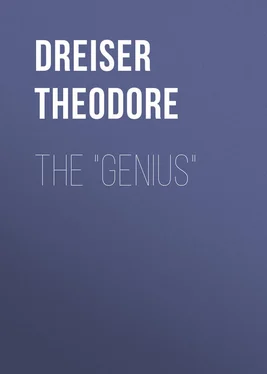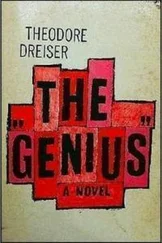Theodore Dreiser - The Genius
Здесь есть возможность читать онлайн «Theodore Dreiser - The Genius» — ознакомительный отрывок электронной книги совершенно бесплатно, а после прочтения отрывка купить полную версию. В некоторых случаях можно слушать аудио, скачать через торрент в формате fb2 и присутствует краткое содержание. Жанр: foreign_antique, foreign_prose, на английском языке. Описание произведения, (предисловие) а так же отзывы посетителей доступны на портале библиотеки ЛибКат.
- Название:The Genius
- Автор:
- Жанр:
- Год:неизвестен
- ISBN:нет данных
- Рейтинг книги:5 / 5. Голосов: 1
-
Избранное:Добавить в избранное
- Отзывы:
-
Ваша оценка:
- 100
- 1
- 2
- 3
- 4
- 5
The Genius: краткое содержание, описание и аннотация
Предлагаем к чтению аннотацию, описание, краткое содержание или предисловие (зависит от того, что написал сам автор книги «The Genius»). Если вы не нашли необходимую информацию о книге — напишите в комментариях, мы постараемся отыскать её.
The Genius — читать онлайн ознакомительный отрывок
Ниже представлен текст книги, разбитый по страницам. Система сохранения места последней прочитанной страницы, позволяет с удобством читать онлайн бесплатно книгу «The Genius», без необходимости каждый раз заново искать на чём Вы остановились. Поставьте закладку, и сможете в любой момент перейти на страницу, на которой закончили чтение.
Интервал:
Закладка:
Angela, with her morbid, passionate, apprehensive nature, did not fail to see disaster looming in the distance. She loved Eugene passionately and the pent-up fires of her nature had been waiting all these years the warrant to express their ardor which marriage alone could confer. Eugene, by the charm of his manner and person, no less than by the sensuous character of some of his moods and the subtleties and refinements of his references to the ties of sex, had stirred her to anticipate a perfect fruition of her dreams, and she was now eager for that fruition almost to the point of being willing to sacrifice virginity itself. The remembrance of the one significant scene between her and Eugene tormented her. She felt that if his love was to terminate in indifference now it would have been better to have yielded then. She wished that she had not tried to save herself. Perhaps there would have been a child, and he would have been true to her out of a sense of sympathy and duty. At least she would have had that crowning glory of womanhood, ardent union with her lover, and if worst had come to worst she could have died.
She thought of the quiet little lake near her home, its glassy bosom a mirror to the sky, and how, in case of failure, she would have looked lying on its sandy bottom, her pale hair diffused by some aimless motion of the water, her eyes sealed by the end of consciousness, her hands folded. Her fancy outran her daring. She would not have done this, but she could dream about it, and it made her distress all the more intense.
As time went by and Eugene's ardor did not revive, this problem of her love became more harrassing and she began to wonder seriously what she could do to win him back to her. He had expressed such a violent desire for her on his last visit, had painted his love in such glowing terms that she felt convinced he must love her still, though absence and the excitements of city life had dimmed the memory of her temporarily. She remembered a line in a comic opera which she and Eugene had seen together: "Absence is the dark room in which lovers develop negatives" and this seemed a case in point. If she could get him back, if he could be near her again, his old fever would develop and she would then find some way of making him take her, perhaps. It did not occur to her quite clearly just how this could be done at this time but some vague notion of self-immolation was already stirring vaguely and disturbingly in her brain.
The trying and in a way disheartening conditions of her home went some way to sustain this notion. Her sister Marietta was surrounded by a score of suitors who were as eager for her love as a bee is for the honey of a flower, and Angela could see that they were already looking upon herself as an elderly chaperon. Her mother and father watched her going about her work and grieved because so good a girl should be made to suffer for want of a proper understanding. She could not conceal her feelings entirely and they could see at times that she was unhappy. She could see that they saw it. It was hard to have to explain to her sisters and brothers, who occasionally asked after Eugene, that he was doing all right, and never be able to say that he was coming for her some day soon.
At first Marietta had been envious of her. She thought she would like to win Eugene for herself, and only consideration for Angela's age and the fact that she had not been so much sought after had deterred her. Now that Eugene was obviously neglecting her, or at least delaying beyond any reasonable period, she was deeply sorry. Once, before she had grown into the age of courtship, she had said to Angela: "I'm going to be nice to the men. You're too cold. You'll never get married." And Angela had realized that it was not a matter of "too cold," but an innate prejudice against most of the types she met. And then the average man did not take to her. She could not spur herself to pleasure in their company. It took a fire like Eugene's to stir her mightily, and once having known that she could brook no other. Marietta realized this too. Now because of these three years she had cut herself off from other men, particularly the one who had been most attentive to her – faithful Victor Dean. The one thing that might save Angela from being completely ignored was a spirit of romance which kept her young in looks as in feelings.
With the fear of desertion in her mind Angela began to hint in her letters to Eugene that he should come back to see her, to express the hope in her letters that their marriage need not – because of any difficulty of establishing himself – be postponed much longer. She said to him over and over that she could be happy with him in a cottage and that she so longed to see him again. Eugene began to ask himself what he wanted to do.
The fact that on the passional side Angela appealed to him more than any woman he had ever known was a saving point in her favor at this juncture. There was a note in her make-up which was stronger, deeper, more suggestive of joy to come than anything he had found elsewhere. He remembered keenly the wonderful days he had spent with her – the one significant night when she begged him to save her against herself. All the beauty of the season with which she was surrounded at that time; the charm of her family, the odor of flowers and the shade of trees served to make a setting for her delightfulness which still endured with him as fresh as yesterday. Now, without having completed that romance – a very perfect flower – could he cast it aside?
At this time he was not entangled with any woman. Miriam Finch was too conservative and intellectual; Norma Whitmore not attractive enough. As for some other charming examples of femininity whom he had met here and there, he had not been drawn to them or they to him. Emotionally he was lonely and this for him was always a very susceptible mood. He could not make up his mind that the end had come with Angela.
It so happened that Marietta, after watching her sister's love affair some time, reached the conclusion that she ought to try to help her. Angela was obviously concealing a weariness of heart which was telling on her peace of mind and her sweetness of disposition. She was unhappy and it grieved her sister greatly. The latter loved her in a whole-hearted way, in spite of the fact that their affections might possibly have clashed over Eugene, and she thought once of writing in a sweet way and telling him how things were. She thought he was good and kind, that he loved Angela, that perhaps he was delaying as her sister said until he should have sufficient means to marry well, and that if the right word were said now he would cease chasing a phantom fortune long enough to realize that it were better to take Angela while they were still young, than to wait until they were so old that the romance of marriage would for them be over. She revolved this in her mind a long time, picturing to herself how sweet Angela really was, and finally nerved herself to pen the following letter, which she sent.
Dear Eugene:
You will be surprised to get a letter from me and I want you to promise me that you will never say anything about it to anyone – above all never to Angela. Eugene, I have been watching her for a long time now and I know she is not happy. She is so desperately in love with you. I notice when a letter does not come promptly she is downcast and I can't help seeing that she is longing to have you here with her. Eugene, why don't you marry Angela? She is lovely and attractive now and she is as good as she is beautiful. She doesn't want to wait for a fine house and luxuries – no girl wants to do that, Eugene, when she loves as I know Angela does you. She would rather have you now when you are both young and can enjoy life than any fine house or nice things you might give her later. Now, I haven't talked to her at all, Eugene – never one word – and I know it would hurt her terribly if she thought I had written to you. She would never forgive me. But I can't help it. I can't bear to see her grieving and longing, and I know that when you know you will come and get her. Don't ever indicate in any way, please, that I wrote to you. Don't write to me unless you want to very much. I would rather you didn't. And tear up this letter. But do come for her soon, Eugene, please do. She wants you. And she will make you a perfectly wonderful wife for she is a wonderful girl. We all love her so – papa and mamma and all. I hope you will forgive me. I can't help it.
Читать дальшеИнтервал:
Закладка:
Похожие книги на «The Genius»
Представляем Вашему вниманию похожие книги на «The Genius» списком для выбора. Мы отобрали схожую по названию и смыслу литературу в надежде предоставить читателям больше вариантов отыскать новые, интересные, ещё непрочитанные произведения.
Обсуждение, отзывы о книге «The Genius» и просто собственные мнения читателей. Оставьте ваши комментарии, напишите, что Вы думаете о произведении, его смысле или главных героях. Укажите что конкретно понравилось, а что нет, и почему Вы так считаете.








